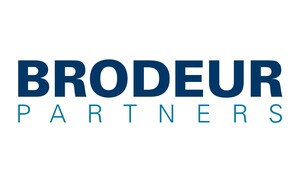
'Tribes' change the game for marketers
Brodeur Partners reveals relevance drivers for formation and composition of new consumer communities
BOSTON, Dec. 14, 2016 /PRNewswire/ -- Shared experiences – more than interests, geographies or professions – spur the formation of modern-day communities, or tribes. And optimistic millennials, often fueled by social networks, are quickest to join tribes, likely to make themselves resilient in this anxious era.
These are two of the key findings in Brodeur Partners' new research on tribes, part of the firm's ongoing exploration into relevance. The new work examines 70 brands, five industries, six social networks and 1,020 American consumers surveyed online.
Author Seth Godin articulated the term tribes in his 2008 bestseller on leadership, "Tribes: We Need You to Leads Us." "A tribe," he wrote, "is a group of people connected to one another, connected to a leader and connected to an idea.... A group needs only two things to be a tribe: a shared interest and a way to communicate."
Among the findings in Brodeur's new research:
- Tribes typically form around shared experiences and interests such as food, politics, the arts, faith, health, fitness, sports, fashion and money.
- The strongest tribes (excluding immediate family) are those based in experiences such as military or volunteer service.
- The younger you are, the more likely that tribes matter in your life.
- Eager to form tribes, millennials are more optimistic than older generations. For example, they are more likely to predict improvement in the economy, environment, education, health care, discrimination and terrorism.
- Brands attract tribes, and tribes find brands. Some brands, however, transcend tribes.
- Social networks play a huge role in "tribal" culture. For millennials, social networks are actually stronger tribe catalysts than real-world interactions.
- There are gender and ethnic nuances in tribes' interests and social network use.
"What makes tribes especially relevant today is the proliferation of brands, the pervasiveness of anxiety in the culture, and the immediacy with which people can come together around shared interests and experiences," said Brodeur CEO Andrea "Andy" Coville, author of Relevance: The Power to Change Minds and Behavior and Stay Ahead of the Competition. "Tribes offer friendship, fun and learning at a time when people are yearning for community."
Tribes, brands and social networks
Brodeur's research yielded surprisingly detailed insights around brands and their appeal. For example, fans of Coca-Cola are more 17 percent more likely than the average consumer to have friends who share their tastes in fashion, and are 14 percent more likely to value friendships made through an artistic activity or group. Other brands investigated include Walmart, Target, Costco, General Mills, Kraft, Nike and Under Armour.
Facebook emerged as the undisputed king of tribe formation. Nearly all respondents said the relationships they are making through this network are growing in importance in their lives. Instagram, however, is ascending in importance, showing significant relevance for women, millennials (18-34) and Gen Xers (35-54).
"Tribes offer a huge opportunity for brands, products, candidates and causes," said Jerry Johnson, a partner at Brodeur Partners, who led the research. "Marketers now need to figure out how to create tribes, attract existing ones, influence them and guide them. This research is a first step in that direction."
Relevance quest
This work is the latest in Brodeur's research into how brands, companies, products, people and ideas become relevant, or meaningful enough to drive behavior change. Brodeur has performed 10 research projects in the past five years and has presented findings at venues such as Harvard Business School, Yale, Boston College, Syracuse Newhouse School, Wharton School, Baruch College, Google and the In2 Digital Summit.
Tribes will be the subject of a forthcoming Brodeur eBook, and a webinar in January, 2017 called "Tribes: the New Segmentation." Check the Brodeur website to learn more.
Methodology
The study was conducted by Brodeur Partners using the Qualtrics Insight panel among 1,020 U.S. respondents from October 11-15, 2016.
About Brodeur Partners
Brodeur Partners is a strategic communications company that helps organizations become and remain relevant in a complicated world. Headquartered in Boston, the company has five U.S. offices and operates in 33 countries globally. It is differentiated by its focus on relevance, behavioral change and ability to bring a discipline-agnostic approach to its non-profit, consumer and business-to-business clients. www.brodeur.com
SOURCE Brodeur Partners





Share this article